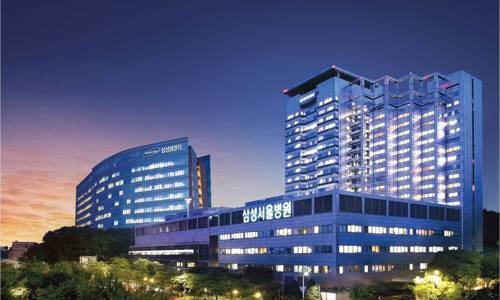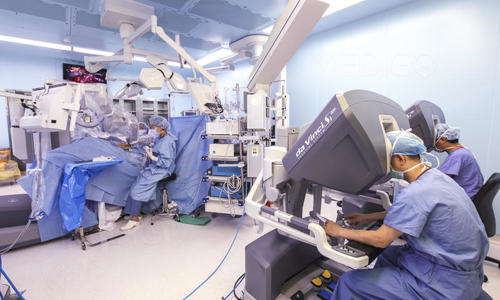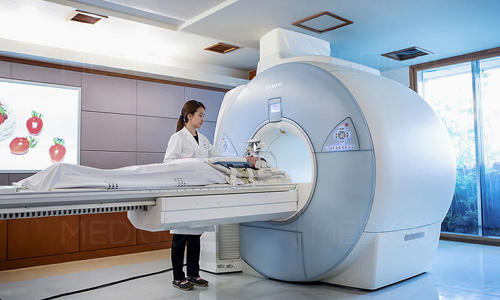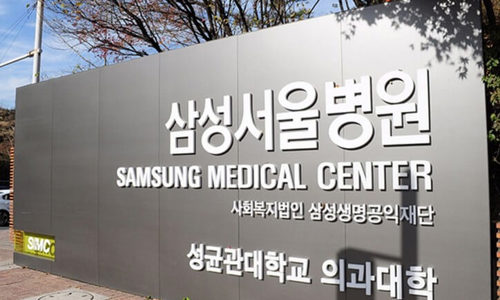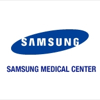Samsung Medical Center
The hospital ranks first in the South Korean Ministry of Health and Social Development in 11 categories in terms of the quality of diagnostics, medical care and services, as well as the first place in the patient satisfaction rating compiled by the Korean periodical Shchisa. By the same Ministry of Health, Samseong Hospital was awarded the prestigious "A" class in 17 quality categories.
Leave a request on our Clinics Direct website and get an individual treatment program, find out the cost of diagnostics, surgery in the best clinic in South Korea!
The hospital has the lowest mortality rate during operations on oncology of the stomach, colon and liver. It has been ranked # 1 in Diagnostic Centers for the Korea Starmark Award for many years in a row.
Samsung Diabetes Center was awarded the Korea Medical Award.
The hospital is also recognized by the College of American Pathologists and the Asia-Pacific Pacific Ethics Committee Forum.
Advanced technology at Samsung
Samsung is equipped with modern medical equipment, including:
- "Da Vinci Robot" - a device for complex and minimally invasive surgery;
- "Rapid Arc" - a device for conducting radiation therapy for the complex treatment of oncological diseases;
- Allura Xper - tomograph for the cardiovascular system;
- system "Smart hospital" (allows you to keep in touch with the doctor and medical staff with the patient using a tablet).
Also, the medical staff keeps track of all the information about their patients using tablets, which are loaded with the medical history, treatment regimen, information about hospitalization and prescribed medications. Patients have the opportunity to make video calls with doctors.
Samsung Centers at Samseong Hospital includes four centers:
-
Diabetic Vascular Center
The Diabetic Vascular Center deals with patients with both types of diabetes, as well as those who experience complications and diseases associated with this disease: diabetic foot, kidney disease, vision problems, sexual dysfunctions, etc.
The Samsung Diabetes Center is Korea's largest diabetes care facility and ranks first in the world for the lowest mortality rate from complications from the disease. For his work he was awarded the "Medical Korea" award according to the edition of the "Economy of Korea".
In addition to the main focus on diabetes, the center's activities also include work with patients with cardiovascular and cerebrovascular (related to the brain) diseases: heart attack, stroke, arrhythmia, angina pectoris, neuropathy. The center houses the departments of ophthalmology, psychiatry, rehabilitation, obesity and others. The center performs open-heart surgeries, coronary artery bypass grafting and other complex types of surgical intervention.
-
Gastrointestinal Cancer Center
The Gastrointestinal Cancer Center is also the largest institution specialized in gastroenterological diseases in South Korea. During the year, over 4000 laparoscopic procedures are performed within its walls - modern minimally invasive operations on internal organs, which are performed using small incisions. Also, more than a million times a year, the center's specialists operate on patients with digestive problems.
For the quality of the work done, the gastrointestinal center was awarded first place for the quality of the operation for colorectal cancer from the Agency for the Inspection and Evaluation of Health Insurance.
-
Breast and Thyroid Cancer Center
The Center for Breast and Thyroid Cancer focuses on minimally invasive interventions, performs endoscopic surgeries and surgeries using the Da Vinci Robot. Like the gastrointestinal center, this center is ranked first by the Health Insurance Inspection and Evaluation Agency for the success and quality of breast cancer surgery.
-
Department of Health
The Department of Health is also called the Center for Preventive Diagnostics and, as its name suggests, specializes in various types of diagnostics, examinations and research on a wide range of diseases, both physical and psychological.
How does the clinic make your treatment comfortable?
![MRI at Samsung clinic]()
One of the main features of the hospital is the “One Stop” diagnostic service, thanks to which the patient has the opportunity to go through all the stages of making a diagnosis within one day, then in three days - to have an operation, and a week later to be discharged from the hospital.
Living conditions in the clinic
Samsung has standard and VIP rooms. The hospital has a garden for relaxation, an art exhibition, a playroom for children with surveillance cameras and a caregiver.
The hospital was honored with the Service Excellence Award “Korea's Best Companies in Service Quality” from the Department of Technology and Standardization of the Ministry of Commerce, Industry and Energy. Samsung also has a Service Excellence Award from the Korea Service Management Association.
Please note that the cost of medical procedures does not include food, drugs and hospital.
Still have questions? Then right now leave a request on the Clinics Direct website or call the contact phone number and our coordinator doctor will help you!
